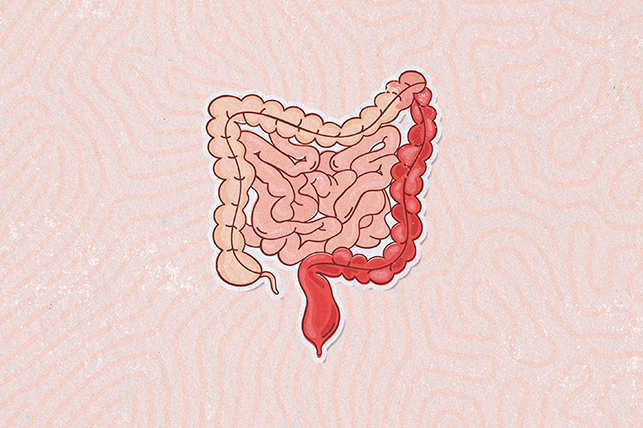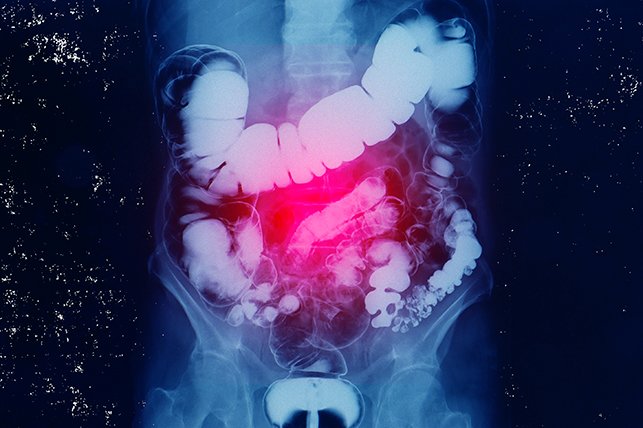Ulcerative Colitis Is a Punch in the Gut

If you or a loved one are experiencing unexplained stomach distress, you may want to look into ulcerative colitis, a disease that causes ulcers and inflammation of the digestive tract. Here, we'll discuss what ulcerative colitis (UC) is, statistics on the disease, plus causes and common symptoms.
"Ulcerative colitis is a chronic disease which affects the last segment of the digestive system called the large intestine, also known as the colon," said Ori Rackovsky, M.D., a gastroenterologist at Gastroenterology Associates of New Jersey.
He said UC is an autoimmune disease, meaning it's caused by a person's own immune system rather than an outside force, such as bacteria or a virus.
"In this case, the immune system, which is very powerful, is erroneously attacking the large intestine and causing damage," Rackovsky said.
Ulcerative colitis is considered an inflammatory bowel disease (IBD), along with Crohn's disease. UC can affect the rectum and may cause diarrhea, bleeding, abdominal and/or rectal pain, trouble with bowel movements (typically frequent and urgent bowels), weight loss and extreme fatigue. In certain severe cases, it can cause sepsis, which can lead to death if untreated.
Ulcerative colitis statistics
Ulcerative colitis is a fairly rare condition, affecting about 1 million Americans, according to Stanford Medicine.
"New cases of UC are relatively rare, numbering between 10 to 20 per 100,000 people yearly in the U.S.," Rackovsky said. "It tends to affect people between the ages of 15 and 30 most frequently, and has a second peak later in life, between ages 50 and 70."
These twin peaks are known as a bimodal pattern of incidence.
Ulcerative colitis occurs in nine to 20 cases per 100,000 people a year, according to a StatPearls article by University of California Davis researchers. It's associated with a Western lifestyle and is most commonly seen in Northern Europe and North America.
Compared to Crohn's disease, ulcerative colitis has a greater prevalence in adults, though it is less prevalent than Crohn's in children. Weirdly, the paper also reports that the prevalence of ulcerative colitis increases in nonsmokers or those who recently quit smoking. Smokers with the disease "tend to have milder disease, fewer hospitalizations and need for less medication," the report stated.
What causes ulcerative colitis?
One of the frustrating aspects of ulcerative colitis is that there is no known cause.
"Currently, the main cause of UC is unknown, therefore, there is no sure way to prevent this disease," Rackovsky said. "UC does seem to have a strong genetic component, so if you have a family history of ulcerative colitis, it is important to be vigilant for symptoms."
Research published in 2020 by Stanford Medicine tied the condition to missing gut microbes that create metabolites that help keep the gut running smoothly. More research on the topic is needed, but in the future, there may be ways to supplement the gut with the needed metabolites.
Treatments for ulcerative colitis
While there is no cure for ulcerative colitis, there are many treatment options, ranging from surgery to lifestyle changes. Some of the most common treatment options for ulcerative colitis include:
- Lifestyle changes. As an initial step in treating UC, doctors may recommend small lifestyle tweaks such as eliminating dairy or keeping a food diary to track specific foods that cause flare-ups.
- 5-aminosalicylates. These are medications taken orally or rectally that help to reduce inflammation both locally in the colon and throughout the body. They're typically prescribed in mild to moderate cases of colitis.
- Corticosteroids. These are a class of steroids, typically prednisone or budesonide, that suppress the immune system, which helps because UC is caused by an overactive immune system. Side effects of steroids include brain fog and increased blood pressure.
- Biologics. These are medications made up of antibodies. They're given intravenously to target proteins in the gut that are associated with inflammation.
- J-Pouch surgery. This is a more invasive treatment option in which the colon and rectum are removed and replaced with a J-shaped pouch made from the small intestine; the pouch allows stools to pass normally.
In-person follow-up might be required for conditions such as ulcerative colitis, but the first step is the most important. Giddy telehealth is an easy-to-use online portal that provides access to hundreds of healthcare professionals whose expertise covers the full scope of medical care.


















